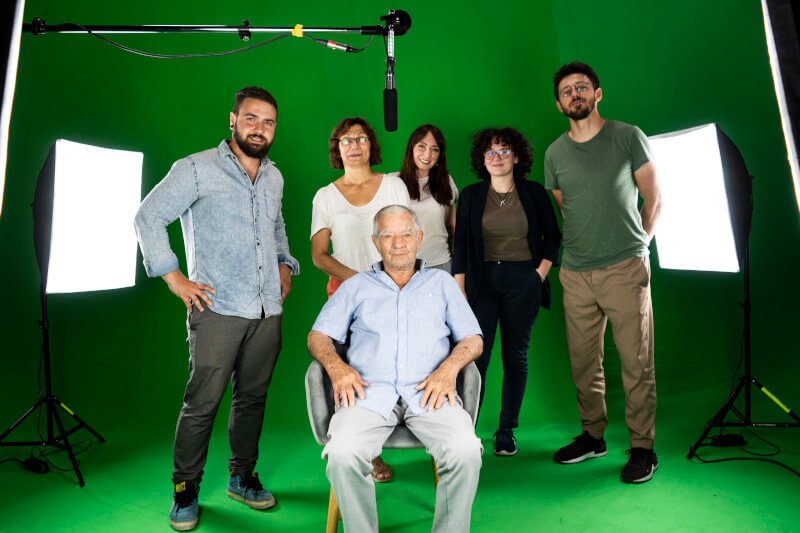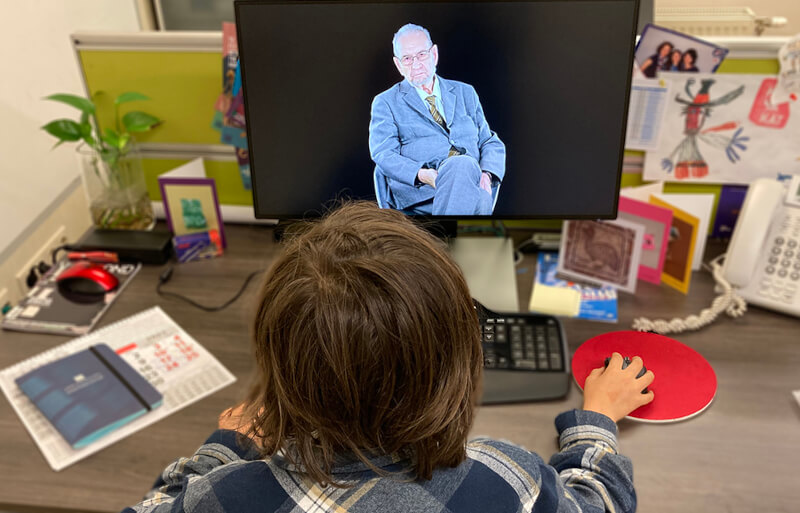
Being able to converse face-to-face across physical distances has been a major breakthrough for humanity. For years, it has allowed us to maintain long-distance personal relationships and deepened global business ties. Crucially, technology-aided communication helped keep the world economy afloat during the COVID-19 pandemic.
Technology now enables conversations across time as well—a development that may prove to be just as crucial.
Through Belene.Camp, for example, anyone with an internet connection can go back in time and speak to a survivor of a communist-era labor camp in Bulgaria. In technology-mediated conversations that roughly resemble video calls, survivors answer questions about their time in the camps, share details about their lives before and after incarceration, and engage in debate about the merits of democracy versus other forms of government.
Thanks to smart technology, these exchanges will be available long after survivors are gone.
Launched in May 2023 by the civic education–focused Sofia Platform Foundation with support from the America for Bulgaria Foundation, Belene.Camp is among a handful of pioneering projects worldwide—and the only one developed in Bulgaria—that harness the power of technology to connect contemporaries to the past.
The goal isn’t to keep us bound to a bygone era, however, but to improve our relationship to the present.
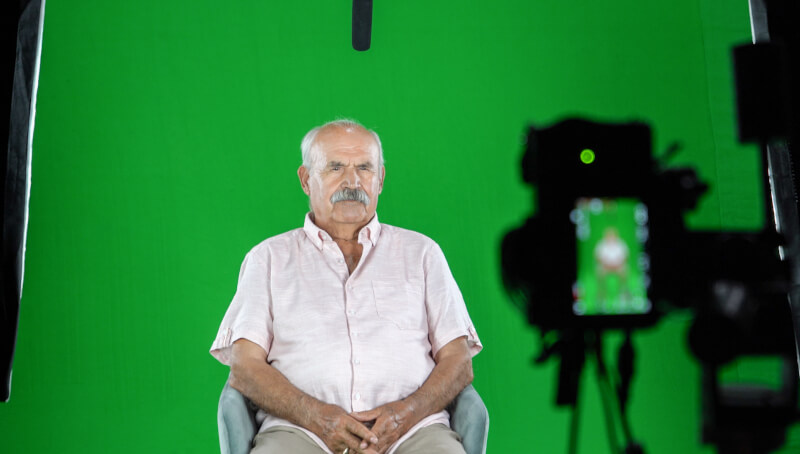
“Much of what is broken in our understanding of democracy in Bulgaria happened during communism and never recovered after it. The key to explaining why we are the way we are and how we can change as democratic citizens lies in the history of Bulgarian communism,” says Louisa Slavkova, director of Sofia Platform and author of numerous publications on civic education.
“There is rampant nostalgia for the past in our society. I look at this nostalgia as a weighing scale. On one side of the scale, there was the guaranteed seaside holiday, pies for 5 cents, free education, and universal medical care. But people forget what is on the other plate: large-scale trampling of human rights,” Ms. Slavkova adds.
On Belene.Camp, individuals can converse with Nikola Daskalov, who spent eight months in the eponymous camp because his father was a regional governor in tsarist Bulgaria. Although Belene was only one of many incarceration facilities for political prisoners during the communist period, it was the longest-operating and most significant of them all, with more 15,000 people believed to have passed through the camp during its forty-plus-year history.
Currently, the Belene.Camp platform also supports interaction with Tsvetana Dzhermanova, who spent four years in the Bosna and Belene camps from 1948 to 1952. Later this year, platform users will also be able to interview former Belene inmates Velichko Velev, Todor Anastasov, and Tsvetko Georgiev as well as Kolyo Voutev, who spent 40 days in the Slanchev Bryag camp near Lovech, in northern Bulgaria.
None of them were ever convicted or stood trial.
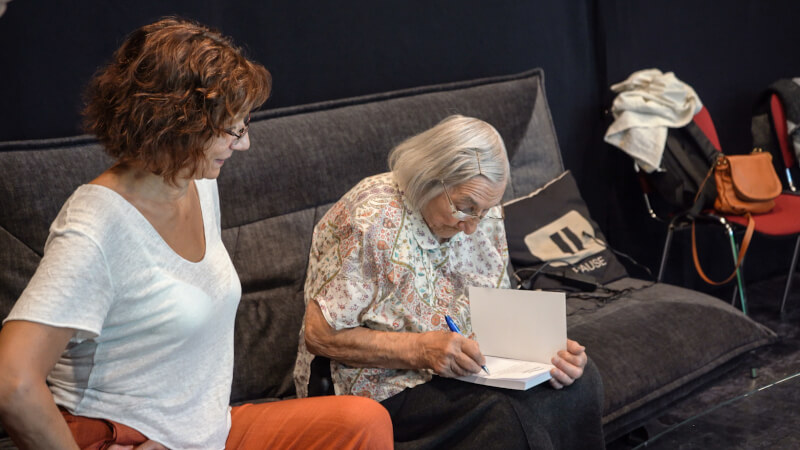
Belene.Camp was inspired by the University of Southern California’s New Dimensions in Testimony project, which enables virtual conversations with Holocaust survivors. Like New Dimensions in Testimony, the Belene.Camp platform uses footage from extensive pre-recorded interviews with camp survivors and a self-learning algorithm to create an experience closely resembling a real-life conversation. Platform users can ask questions out loud or type them in the platform’s chatting application. The platform’s backend algorithm then selects the most relevant answer, which is delivered by the camp survivor’s virtual self.
“The experience is similar to talking to someone via video conferencing on one of the popular chat and video calling apps we all have on our phones,” explains Borislav Dimitrov, Sofia Platform’s deputy director, who helped conduct the interviews with camp survivors and manages the algorithm training process.
“The site is under development and will be for a long time. The software that makes the virtual conversation possible is constantly being improved. The more people talk to Tsvetana and the other former camp inmates, the more accurate their answers will become,” Mr. Dimitrov says.
To ensure conversations cover a variety of topics in sufficient detail, the Sofia Platform team asked each interviewee between 500 and 600 questions, with total footage recorded to date spanning more than 120 hours. The project is a herculean effort, but a necessary one: the youngest camp survivors are in their 80s; Tsvetana Dzhermanova turned 95 in March.
The Sofia Platform team conceived of the project with youth in mind — Belene.Camp is dedicated to “young people in Bulgaria and to the memory of communism’s victims” — which is why they sought an interactive approach to discussing the past and its impact on the present.
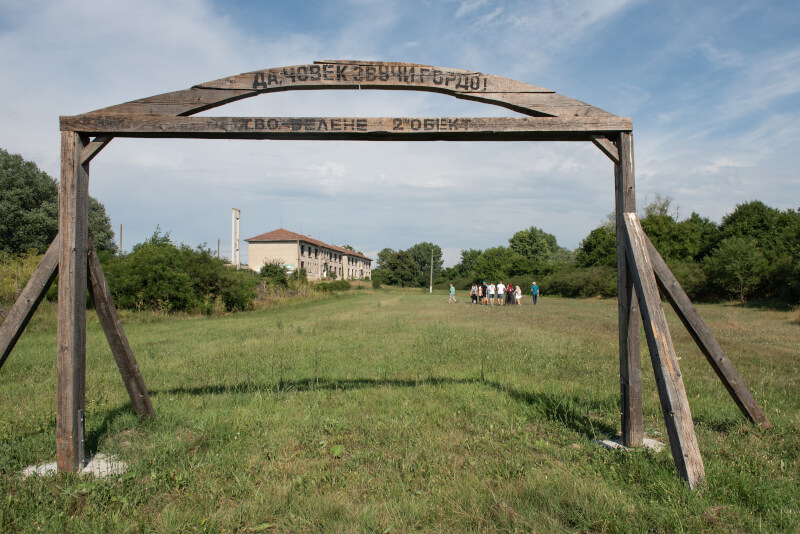
“We all know that young people look for interactivity, so for years it was our dream to do virtual interviews with survivors,” Mr. Dimitrov explains.
The Sofia Platform team knows how powerful encounters between students and survivors can be. During the organization’s annual summer school for high school and university students in Belene, youth have a chance to ask survivors about their camp experience face-to-face. Tsvetana Dzhermanova has been a frequent guest over the past few years.
To recreate what summer school participants experience, Sofia Platform created a virtual tour of the area and developed additional resources for people who want to deepen their knowledge of communist repression. Moreover, the team is working on an English-language of the platform to ensure a wider reach.
Virtual conversations with survivors are powerful regardless of a person’s age. Unlike more traditional formats like books and audio and video storytelling, this type of technology-mediated exchange allows for two-way communication. Nothing compares to the feeling of discovering Kolyo Voutev’s jarring story through direct inquiry. His stay in the camp may have been the shortest among the featured survivors, but it was especially scarring.
In the late 1950s, he was briefly incarcerated in the ironically named Slanchev Bryag (Sunny Beach) Camp. (The country’s most famous seaside resort is also called Slanchev Bryag.) The short-lived but infamous camp had a reputation for reforming hooligans. In reality, it was a brutal place for punishing the politically inconvenient that few left alive. Mr. Voutev belonged to that minority. He appears to have been released because he had athletic promise.
Mr. Voutev died shortly after he was interviewed for the Belene.Camp project in 2022, аged 82. He was the last known survivor of Slanchev Bryag.
Thanks to Belene.Camp, the plucky former wrestler will live on to tell his tale to posterity.
